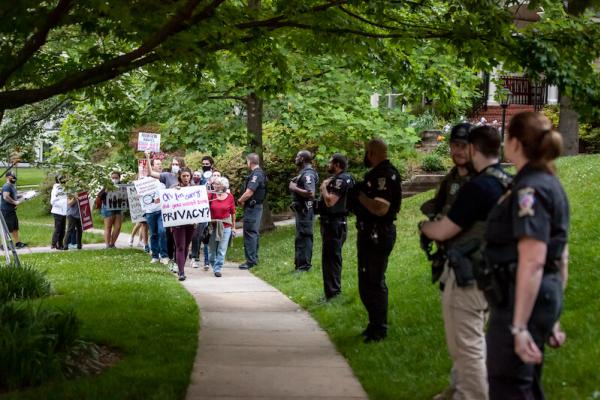This spring, disruptive protest tactics against high-profile public officials raise the question: Are there times when aggressive protest is not only helpful but also necessary?
After a leaked Supreme Court draft opinion revealed that the Court is poised to overturn Roe v. Wade, protesters began taking to the streets outside Supreme Court Justices’ houses. Politicians and commentators have expressed condemnation and concern about these tactics. In an attempt to curtail protests outside of politicians’ homes, Florida has passed a new law banning protests in residential neighborhoods. After the horrific mass shooting in Uvalde, Texas, gubernatorial candidate Beto O’Rourke confronted Gov. Greg Abbott, interrupting his press conference to blame Abbott for the massacre saying, “This is on you.”
Here in Los Angeles, the current mayoral race has been marked by disruptive protests at debates. Police have responded aggressively to these disruptions and the mainstream media has derisively characterized disrupters as “idiot protesters” who are supposedly making debate impossible. Reopening for in-person meetings, City Hall has decided to enforce its code of conduct to prevent disruptive protesters from having access to city council meetings.
Christians are often unhelpfully wary of aggressive protest tactics. They promote a particular understanding of “unity” or “love” prioritizing “civility” over difficult conversations that lead to justice. Some Christians are even uncomfortable being present during debates or protests where activists utilize more aggressive tactics. But Jesus’ Sermon on the Mount and Paul’s letters to the church help Christians analyze power and privilege so that they can engage in healthy disruption and confrontation.
The Bible’s ethical principles can also offer guidance when Christians find themselves as the target of protests. Some organizers fighting for a more just society are understandably critical of the ways in which Christians and Christian theology have been complicit in injustice — whether through our actions, our positions of power, or our association with historically oppressive institutions. As a result, we may find ourselves facing disruptive protesters.
Maintaining a distinction between disruption and violence is essential. Raising hell outside a public official’s home or office is not an act of violence. Repeatedly confronting an official in public, using profanity to describe an untenable situation, or repeatedly interrupting a mayoral candidate in a debate or speech is not violence.
Violence is using power over someone in order to do physical or emotional harm to them, resulting in serious suffering. As restorative justice practitioner Danielle Sered writes in her book Until We Reckon, doing harm is a misuse of power. Framed in this way, violence can include both passive or intentional support of social structures and authorities that impose immiseration. Two examples of this are police violence or destructive “sweeps” of encampments of unhoused people. When this violence is not recognized as such by dominant voices, disruption of the status quo becomes necessary.
Jesus did not call his disciples to do violence but he knew that his ministry would inevitably be disruptive because of his commitment to proclaiming the good news of God’s justice (Matthew 10:7). Understanding the disruptive nature of his ministry, Jesus explained that he had “come not to bring peace but a sword” (Matthew 10:34). Jesus’ fidelity to making visible God’s ongoing commitment to social justice for the poor and marginalized compelled him to embrace the disruptive nature of his ministry.
In fact, disruptive protests and interruptions can bring pressure and also lift up perspectives that are otherwise erased from political discourse. Oftentimes, these perspectives are erased because the people who hold these perspectives are marginalized.
Liberation theologian Paul F. Knitter argues that everyone, especially Christians, should recognize “the hermeneutical privilege of the poor.” Knitter explains in his chapter “Inter-Religious Dialogue and Social Action” in The Wiley-Blackwell Companion to Inter-Religious Dialogue, that those experiencing oppression “see things and know things that those who are part of the mainstream of power simply cannot see.” Knitter’s observation not only applies to matters of knowledge and power, but also to Christian teachings on community. Paraphrasing Paul in 1 Corinthians 12:12-27, those parts of the body that are vulnerable should have greater honor. Applying this teaching to our actions would mean recognizing our place is always in the street with the protesters instead of in the halls of power trying to keep protesters out.
In the L.A. mayoral race, disruption is making space for ignored perspectives. Most of the leading candidates have failed to support defunding the police or offer a strategy for addressing the crisis of homelessness that abjures criminalization and displacement. When mainstream discourse is unwilling to name that policing itself is a form of white supremacist violence and that encampment sweeps enact violence against unhoused people, it makes sense that protesters would opt for a disruptive approach. Rather than “restricting” debate, these disruptions created the necessary space for honesty, demanding that politicians name and reject the systems and structures that produce violence and deny people’s dignity.
In her book, This Here Flesh, Cole Arthur Riley quotes civil rights leader Bayard Rustin: “When an individual is protesting society’s refusal to acknowledge his dignity as a human being, his very act of protest confers dignity on him.” Recognizing this dignity, a Christian perspective takes the voices of disenfranchised protesters more seriously than the voices of political insiders. Protest rightly forces our attention away from the powerful and turns our attention toward those at the margins fighting for their dignity.
For Christians in positions of privilege and power, such a turn to the margins raises an even harder question: What should we do when disruptive tactics are aimed at us?
Jesus tells us in the Sermon on the Mount that before seeking the speck in someone else’s eye, we should look for the log in our own eye (Matthew 7:3-5). Rather than criticizing the perceived flaws in protesters’ tactics, we should engage in self-reflection. Then, when faced with disruptive or discomfiting protests, our response should always be to examine what may have prompted the protest and how our response can be guided by a commitment to nonviolence and non-retaliation.
We should always adopt a listening posture when interacting with protesters — even if we would not use their tactics. Regardless of the “incivility” of their methods, even methods directed against us, we should always seek the underlying truth of their claims for justice. This may require overcoming our own tendency toward anger and defensiveness. In Romans 12:14-21, Paul explicitly offers advice to Christians concerning confrontation or persecution: Concede as much as possible without compromising your conscience for the sake of making peace.
Healthy confrontation is the opposite of stifling disruption. From this lens, an ethic of non-retaliation is essential, as we seek to hold space to work through tensions in the struggle for justice. Protest that utilizes disruption is a way to bring the issues of injustice to the fore. Embracing confrontation and conflict requires listening to the voices of protesters — taking into account the hermeneutical privilege of the poor — and overcoming our tendency toward defensiveness in order to find creative solutions within the tension (1 Corinthians 6:1-6; Ephesians 4:25-32).
When faced with disruption, who do we sympathize with? If our sympathies are properly on the side of the marginalized, then the response to disruptive protest is simple: Listen. Concede. Address their concerns. From Supreme Court Justices to mayoral candidates to each of us in our own conflicts, disruptive protests are an invitation to change our individual opinions and build stronger communities.
The right response to disruptive protest is to accept the invitation it brings: an invitation to center new perspectives and engage in confrontation and conflict for the sake of justice.
Got something to say about what you're reading? We value your feedback!






